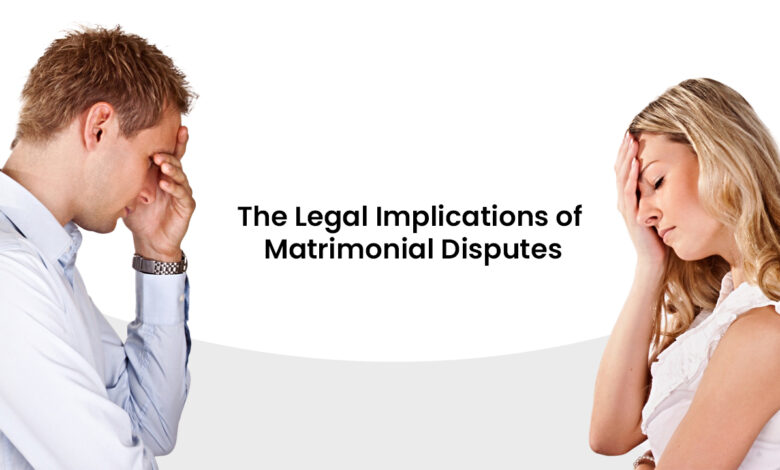Legal Implications of Matrimonial Disputes

In Indian society, marriage is treated as a holy thing. Marriage is believed to be the confluence of two different individuals and two different families as well. An interesting fact about marriages is; each person has different traits, personalities, likes and dislikes, opinions and choices but still, they choose to be with the person.
When two different people come together, it is obvious that some sort of distribution may happen and if it goes further, it may turn out to be matrimonial disputes. In general words, Matrimonial disputes are such issues or disputes where married couples are struggling with their relationship.
As a legal student, to understand such complicated disputes in-depth, you need to first understand what marriage disputes are.
What is the definition of marriage disputes?

For basic human understanding, we can say that matrimonial disputes are such issues arising in every common marriage, which are recognized by Indian law. It also comprises family disputes, divorce, enforcement of divorce settlement agreements, suits for maintenance, rights of access to children, cases of custody, protection orders and so on.
In a typical marriage, disputes or disagreements can be around anything, which might range from small misunderstandings to huge disagreements. A few of the reasons behind matrimonial disputes have been mentioned below:
Causes Of Matrimonial Disputes in Family or Marriage
1. Co-Dependency And Expectations
A couple spending too much on their partner can sometimes become the ultimate ground of matrimonial disputes. Discrepancies in thought processes can lead to conflicts, resulting in unhealthy relationships. For example, in a relationship where one spends a lot of capital and the other person is a miser, or a husband expects his wife to only look after his house, and the wife wants to do a job, such situations may lead to a matrimonial dispute.
2. Domestic Violence

Domestic violence is one of the harsh realities of our society. But wait what do you think about domestic violence? Domestic Violence is not only happening with females but also with men who are the victim of domestic violence. Domestic violence is not bound to a single gender. Anyone can be a victim of such things.
There are several cases in this world where women and men are mistreated by their partners or in-laws.
But yes, we can’t deny the fact that women face more domestic violence than men. Women face physical, mental, verbal, and emotional abuse, which is considered the biggest ground for divorce.
The Protection of Women from Domestic Violence Act 2005, was implemented to rescue women from domestic violence. Under Section 2 of the Domestic Violence Act, 2005, it is stated that any sort of physical, verbal, emotional, economic, and sexual abuse caused to someone is a punishable offence.
3. Offence/Misdeed Against Marriage
While talking about matrimonial disputes, an offence against marriage can be regarded as adultery or bigamy earmarked by either party to the marriage, and it may lead to a marital disagreement, which later becomes one of the leading reasons for divorce.
Popular Remedies For Matrimonial Disputes
During the matrimonial issues, a couple approaches a family court, as family courts are supposed the best medium to provide fair justice in such circumstances. Married couples approach the court for remedies such as mediation, conciliation, etc. As per the Hindu Marriage Act 1955, there are many matrimonial provisions that offer ease to the aggrieved party. These provisions are as follows:
• Restitution Of Conjugal Rights (Section 9)

Under Section 9 of the Hindu Marriage Act, it is quoted that when either of the partners, without a valid cause, withdraws from their wedding, then the other spouse or the aggrieved party can apply for the restitution of conjugal rights.
When section 9 is applied, the court asks for a pardonable logic as well as a remedy, considering the other spouse.
• Judicial Separation (Section 10)
As per section 10 of the Judicial Separation Act, the court suspends the rights and duties of marriage for a short duration, tentatively around six months. Adultery, cruelty, desertion (2 years), conversion (apostasy), insanity, leprosy, venereal diseases, renunciation from the world, not being heard for 7 years, bigamy, husband guilty of rape, sodomy or bestiality are some of the grounds for judicial separation.
• Void And Voidable Marriage (Sections 11 & 12)
Section 11 of this Indian marriage act stated that any marriage, which is opposed to clauses i.e. neither of the parties has a living spouse at the time of marriage, parties shouldn’t come within the degrees of the restricted association unless the custom permits, the parties are not sapindas (cousin marriages in Hinduism) for each other unless custom permits under Section 5 of Hindu Marriage Act, 1955, will be considered as void marriages. Under this section, maintenance cannot be claimed.
The 12th section of this act stated that any marriage contravening clause 2, i.e. “neither party is incapable of communicating their consent or suffering mental disorder or disqualified to the procreation of children” of Section 5 of Hindu Marriage Act, 1955, will be considered as a voidable marriage. As per the 5th section of the Hindu Marriage Act,1995, the wife can claim supervision and the family court can also provide “maintenance opened pendant lit”, which indicates that maintenance can be delivered even during the time of pending litigation.
• Divorce (Section 13)

The idea of divorce is the same as the vision of judicial detachment. Under the Hindu Marriage Act, the bases for divorce are also the same as the grounds for judicial detachment. The only contrast between section 10 of Judicial Separation and divorce is that section 13 allows re-marriage under section 15 of the Hindu Marriage Act.
Being a legal student or common person, you must know that section 13 has two sub-sections, such as;
1. Section 13(A)- Under section 13 A, the law provides alternate relief in divorce proceedings, such as the maintenance, and custody of children, and so on.
2. Section 13(B)- If any party want to get a divorce on mutual understanding or consent, this 13B section is helpful for them.
As per Muslim law, a husband can divorce his wife in 2 manners, i.e. Talaq-ul-Sunnat, and Talaq-e-Biddat. A Muslim wife can divorce her husband in 3 manners, i.e., Talaaq-i-tafweez, Lian, and by dissolution of the Muslim Marriages Act, of 1939.
Triple Talaq was one of the oldest divorce practices that were followed by Muslims and had been declared unconstitutional by India’s Hon’ble Supreme Court on 17th August 2017.
Indian Constitution established provisions for marital disputes according to the situation. However, it is constantly working towards amendments and creating new rules for divorce in India to resolve various other areas of the same.
In case, you and your partner need to file a divorce case, you required only professional lawyers that can examine and present your case in front of the judge.
You can find the best advocate in Chandigarh and pan India.
Conclusion

The cases of matrimonial disputes have only been increasing in the country. These disputes not only affect the couple seeking relief, but also the family members, especially the children. Matrimonial disputes often happen when the interests and desires of the couple do not match and remain unfulfilled.
When both spouses reach a stage where they give more preference to their interests and opinions and disagree with each other’s opinions and desires, conflicts happen, sometimes leading to divorce.
Divorce leaves a big impact on one’s family, especially on those families where they have children. This might also affect the growth of the child as well as his/her future. The legal system along with the remedies and legal aid is also trying to focus on minimizing the number of cases of divorce.
The couples with these matrimonial disputes are now being subjected to counselling and trying to bring in an attitude of adjustment among the couple.
Through this, there might be a chance of the re-establishment of a friendly relationship among them. As marriage is considered a sacred and significant institution for a civilized society, the preservation of marriage is considered a priority by the present legal system of our country, as the law allows some time to set things right before the couple finally gets separated.
The Constitution of India has provisions for matrimonial disputes and couples seeking a divorce, such as Judicial Separation (Section 10), Void and Voidable Marriage (sections 11 and 12), and more. However, one needs a professional divorce lawyer to present their case in the family court.
You can find the right advocate in Chandigarh and other parts of India. One of the trusted law firms is Lex Solutions. If you want an experienced lawyer to work on your case, you should definitely approach the law firm.